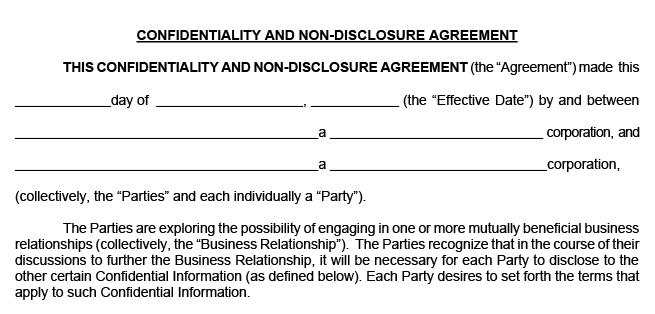When looking for an attorney, it’s important to have one that’s experienced with mergers & acquisitions transactions so that these transactions are properly processed.
Confidentiality Agreement

A confidentiality agreement is often used when a transfer of ownership may take place. This agreement protects the buyer, seller, and their employees. The seller may not want employees to know there may be a change in ownership. Generally speaking, this information is not released until the sale is complete. Some of these forms are complicated and may affect your negotiating later on. So, seek advice from your attorney before signing these forms.
Exclusivity Agreement
This document protects the buyer. Basically, it tells the seller not to negotiate with anyone else while the buyer is working out a deal. This should be drafted by your attorney and signed by the seller as soon as possible. Otherwise, you will be battling with another person trying to buy the same business.
Steps in Buying a Business
The first steps in buying a business involve conversations about price and the legal structure of the sale. Sometimes parties send emails, talk on the phone, or hold video chats. This is the negotiation phase. Occasionally, a letter of intent (LOI) may be part of negotiations. It’s important to have your attorney look at any written texts or documents before you send them to the seller. A business attorney’s guidance may protect you from accidentally sending something to the seller that becomes “binding.” In other words, what you view as an “offer”, the other party may view as a contract or promise. So, always protect yourself by seeking your attorney’s advice.
Documents Seller Gives to Buyer
Buyers must be very careful and use “due diligence” when buying a business. First of all, a buyer must obtain the following general information regarding the business. An experienced business attorney helps obtain this information.
- Articles of incorporation and bylaws
- List of shareholders
- Company’s organizational chart
- Employee information- wages, benefits, job titles
- Client list
- Customer list
- Inventory
- Property owned by company
- Partnership agreements
Next, the buyer must have an accountant determine the financial status of the business.
- Examine tax returns
- Go over balance sheets
- Check for lien on business
Business Purchase Agreement
Once the buyer decides to purchase the business a formal Purchase Agreement is drafted and signed by both parties. Of course, an attorney must draft this purchase agreement to protect both parties. Purchase Agreements may include non-compete clauses, information on the transfer of intellectual property, dates and transition information.
Since there is such a wide variety of businesses, each purchase agreement must be tailored to that specific transaction. For example, a dentist selling his dental practice would have a differently structured purchase agreement than a lighting company that is selling their brick and mortar store, products, customers, and access to product representatives.
Of course, the dentist may own the building his practice is in and the dentist has accumulated an extensive client list, too. Basically, there are similarities and differences. However, each business requires an experienced attorney to draft the purchase agreement.
Additional Documents
Many complex legal documents are part of buying a business. The following are some additional documents used in business acquisitions.
- Acquisition agreement (warranties, indemnities, covenants)
- Due diligence questionnaire
- Asset agreement
- Share agreement(warranties, indemnities, restrictive covenants, limitation of liabilities, tax indemnities, disclosure letter)
- Completion documents
To sum up, future business owners should seek legal advice from a business attorney regarding buying a business.
